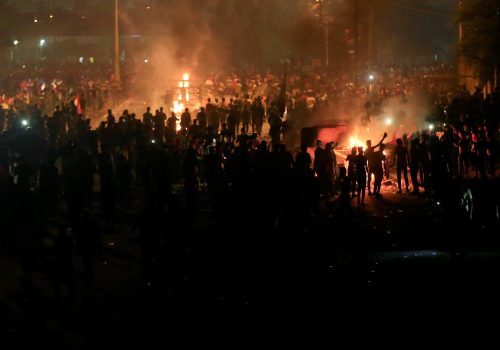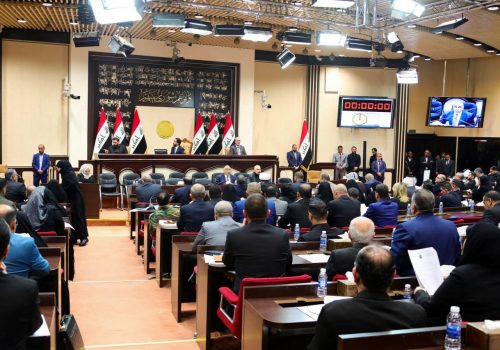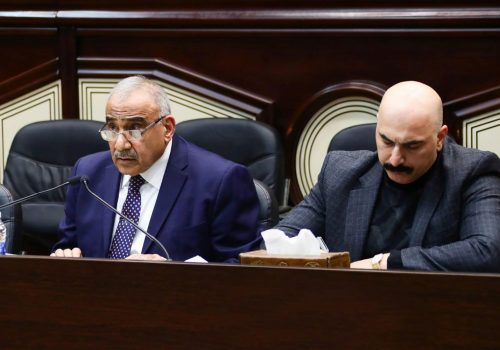Challenges for Iraq’s new government under Mustafa Al-Kadhimi
The protests that started in October 2019 ushered in a new political era in Iraq. For the first time in the post-2003 process of democratic transition, a government was forced to resign due to popular pressure.
The resignation of Prime Minister Adil Abdul-Mahdi’s cabinet forced the Iraqi political leadership to face contentious constitutional and procedural questions about government formation. Iraq’s constitution contains many ambiguities about the prime minister selection process even under usual circumstances (i.e. following a regularly scheduled election). The challenging situation was exacerbated by a reckless combination of both politicizing the interpretation of the constitution and circumventing it entirely.
Prime Minister Abdul-Mahdi prophetically advised his opponents to agree on his successor before he submitted his resignation, for he knew that the Iraqi political framework would not function in the vacuum that would result from his absence. His fears were well-justified. The chaos that ensued following his resignation nearly paralyzed Iraq’s leadership, as they struggled to deal with mass gatherings of angry protesters with a broad list of demands, a dangerous escalation of the US-Iran conflict that played out on Iraqi soil over recent months, and the COVID-19 pandemic.
After exceeding the constitutionally mandated deadline to choose a new prime minister and transparently exhausting all the loopholes to buy time to create a political consensus, President Barham Salih designated Mohamed Tawfik Allawi to form a government. Despite the selection, objections from various powerful political blocs ground the process to a halt. The Council of Representatives failed to reach a quorum twice and Allawi’s cabinet was not put up for a vote. Salih, then, designated Council of Representatives Member Adnan Alzurfi to form a cabinet, but Alzurfi’s candidacy caused deep cleavages within the Shia political blocs and he was forced to withdraw his nomination before a confirmation session could be scheduled.
Salih, next, designated a third candidate, National Intelligence Chief Mustafa Al-Kadhimi to form a cabinet. Al-Kadhimi was supported by a Shia consensus and, absent any major disputes over the negotiations of “who gets what,” he will be confirmed as Iraq’s new prime minister. But this will only be the beginning of the formidable challenges Al-Kadhimi will face.
The next Iraqi government will have to deal with the accumulation of problems that forced Abdul-Mahdi’s government out of office as well as the crises that emerged thereafter. Immediately after his confirmation, Al-Kadhimi’s government will be faced with the unenviable task of finding ways to run the state with a small fraction of the revenues Iraq typically receives from oil exports due to sharply declining prices. The government must also make urgent efforts to continue to contain the spread of coronavirus despite Iraq’s depleted healthcare system. Iraq will need to secure as much support as possible from the international community, which is difficult, since, the entire world is consumed with battling the pandemic and there is a scarcity of resources worldwide.
The new government must also continue the fight against terrorism and address the problem of militant groups that defy state authority, who are, at the same time, partners in the fight against terrorism and formally considered part of the Iraqi security forces. This is a domestic and international demand that must be handled delicately to ensure that the cure is not worse than the disease, as was the case when the disbanding of Saddam Hussein’s security forces in post-2003 was utterly bungled.
Another important item on the new government’s to-do list is to bring the politically powerful killers of peaceful protesters to justice. Hundreds of protesters and members of the Iraqi security forces were killed and thousands were injured between October 2019 and March 2020. No credible investigations or fact-finding work were conducted to identify the culprits. The government blamed non-state actors while the protesters accused government security forces and militant groups of committing these crimes. Conducting a credible investigation, holding the perpetrators accountable, and fairly compensating the victims will assuage the ire of the protesters, who can be expected to converge on protest sites as soon as the coronavirus crisis is over. If the government does not take strong action on this front in a way that is acceptable to the protestors, they will redeploy their wrath against the new government, ensuring further instability.
Another major task for the new Iraqi government is conducting the potentially controversial talks with the United States to restructure the future of bilateral relations, which are set to start this summer. In January, Prime Minister Abdul-Mahdi’s government worked with the Council of Representatives to pass a resolution calling for the withdrawal of foreign forces from Iraq. The Iraqi government, then, requested that the United States send a delegation to negotiate the terms of withdrawal. The US State Department response stated that “any delegation sent to Iraq would be dedicated to discussing how to best recommit to our strategic partnership—not to discuss troop withdrawal, but our right, appropriate force posture in the Middle East.” On April 5, the Iraqi foreign minister announced that the Iraqi Government received a letter from the US government “suggesting negotiations based on the Strategic Framework Agreement and conducting a comprehensive review of the future of bilateral and regional relations in the economic, cultural, trade, and security fields.” The talks are scheduled to start on June 10, which is very short notice considering the timeline for forming an Iraqi government. These talks, if conducted in good faith, can be a unique opportunity to solve many problems in US-Iraqi relations, but Baghdad’s leadership needs to reach a consensus on what the endgame should be. Otherwise, we will witness another lost opportunity.
The next Iraqi government is also facing vociferous demands to prepare for early national elections to replace the sitting members of Iraq’s Council of Representatives, whose terms end in 2022. There are three important counterarguments against holding early elections that must be considered. First, there is no clear constitutional authority for the government to hold a new election unless the Council of Representatives votes to dissolve itself. At the present time, such a vote is not expected to take place. Second, there are several necessary requirements for holding a credible election that would meet the expectations of Iraqis, particularly the protesters. Those conditions include a new election law, new districting, and a reformed High Election Commission. By the time all these preparations are made and an election is held, a new, fully authorized government would not be formed until the end of 2021 or, maybe, even early 2022. There would be no gain from such a process, as the current term of the Council of Representatives would automatically end a few months thereafter. Third, and most importantly, dissolving the Council of Representatives to open the door for a new election would turn the government into a caretaker with very limited authority. Given the momentous challenges that Iraq faces and the hard work needed to get Iraq through the aforementioned economic, health, and security issues, it would be irresponsible to put the country on this path and elect a new Council of Representatives a few months before their term is completed. What Iraq needs most in the coming months is not a new election, but a fully authorized government to handle the grave economic, political, and social challenges, while simultaneously working on a reform package to set the stage for more effective governance and to restore legitimacy and popular confidence in the political system.
Dr. Abbas Kadhim is director of the Atlantic Council’s Iraq Initiative. Follow him on Twitter @DrAbbasKadhim.
Image: Iraq's President Barham Salih instrcuts newly appointed Prime Minister Mustafa al-Kadhimi in Baghdad, Iraq April 9, 2020. (Reuters)


